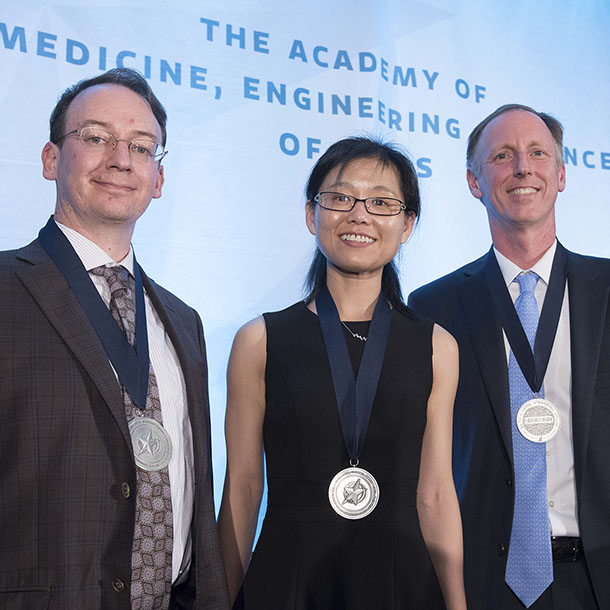2017 O’Donnell Awards Recipients

These are the discoveries by Texas’ rising stars in research being honored with the 2017 Edith and Peter O’Donnell Awards by TAMEST.
This year’s recipients of the O’Donnell Awards showcase the best and brightest in Texas research, whose creative work could have a lasting impact on our lives.
Medicine
Meng Wang, Ph.D.
Dr. Wang, associate professor of molecular and human genetics at Baylor College of Medicine, is the recipient of the 2017 TAMEST Edith and Peter O’Donnell Award in Medicine.
As humans live longer, Wang’s work looks at how to improve our “health span” in addition to our lifespan. Through her unique studies of worms, she has discovered new genetic and molecular insights into how humans age. She’s also exploring natural compounds to develop therapies that could result in healthier aging. “Dr. Wang is a bright, wonderful, passionate scientist, with a curiosity about problems that are really important for general health,” says Huda Zoghbi, M.D., professor of molecular and human genetics at Baylor College of Medicine. “Through her innovative genetic and technological approaches, she’s really provided beautiful insight about some pathways that regulate health and longevity. She’s discovered a totally independent way to affect life span.”
Learn more about Dr. Wang and her discoveries.
Engineering
Andrew Dunn, Ph.D.
Dr. Dunn, professor and director of the center for emerging imaging technologies at the University of Texas at Austin, is the recipient of the 2017 TAMEST Edith and Peter O’Donnell Award in Engineering.
Dunn has developed technology that allows us to see things we haven’t seen before in the human brain. Through his laser speckle imaging technique, we can now see blood flowing in the brain in real time, allowing us to see where clots are forming. This allows neurosurgeons to easily identify areas suffering from reduced blood flow and prevent strokes. “He has developed this magnificent laboratory and exceptional research. He’s been able to use advanced optical techniques to really see the very early stages of clots in the brain. This was not possible before he started working on it,” says Nicholas Peppas, Sc.D., Cockrell Family Regents Chair in Engineering No. 6, Family Chair for Department Leadership No. 1 and Professor of Chemical Engineering at the University of Texas at Austin.
Learn more about Dr. Dunn and his discoveries.
Science
Daniel Bolnick, Ph.D.
Dr. Bolnick, professor of integrative biology at the University of Texas at Austin, is the recipient of the 2017 Edith and Peter O’Donnell Award in Science.
Bolnick has deepened our understanding of how evolution and ecology intersect. His work often takes him out in the natural world, including yearly trips to Canada to study parasite resistance in fish. By understanding how some fish are resistant to parasites, we could achieve a better understanding of our own immune systems, which could lead to better treatments for everything from allergies to Crohn’s Disease. “It’s this synthesis of ecology and evolution that’s enabled him to open up a whole new area. This environment he’s created for himself is really rich and ripe for the possibilities of discovery,” says Daniel Jaffe, Ph.D., vice president for research at the University of Texas at Austin. “He’s really broken new ground across a very broad field that has a lot of impact.

